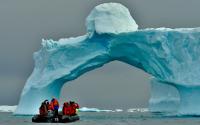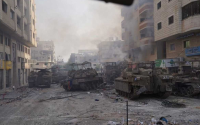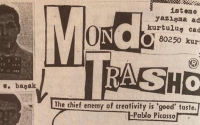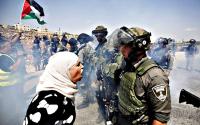Luke Harding in Kundoz meets the surrendering remnants of a utopian movement facing the end The Observer, Sunday November 25, 2001They arrived in darkness, then sat until dawn in the desert. The Taliban's elite foreign fighters were supposed to fight until the death. But early yesterday morning they packed into five open trucks and three pick-ups and headed east out of Kundoz in a swirl of choking dust.
At 3am they arrived unannounced on the outskirts of Mazar-e-Sharif, Afghanistan's northern city. They waited.
As we set off from Mazar early yesterday, we had no idea they were there. The road out of the city seemed unusually frantic. We passed a checkpoint manned by opposition fighters and dozens of Jeeps packed with soldiers. We kept going.
And then 200 yards ahead of us in the desert were hundreds of soldiers in black turbans, sitting placidly among the dunes in neatly-spaced groups. Some of them were asleep in black tents. A few were dozing; others stretched in the morning sunshine.
'Taliban,' my driver shouted. He spun the car around. We paused a moment. The local opposition commander Gulam Sakhi came to talk to us. 'There are 400 of them. Only 30 of them are Afghan. The rest are foreigners,' he said. 'Some of them are Pakistanis and Chechens. They came overnight from Kundoz. They still have their weapons. They have agreed to surrender.
Are there any Arabs among them, I asked? 'We don't know,' he said. 'Probably.'
The Taliban commander, who had been negotiating with his opposite number the modalities of surrender, tapped on our window. He was dressed in a green turban and a blanket, and his dark eyes almost seemed streaked with kohl. 'He says it is time to leave,' Gulam Sakhi said.
When Mullah Mohamed Omar founded the Taliban seven years ago with only 30 fighters he could have anticipated neither his movement's extraordinary success, nor the bleak and rapid manner of its undoing.
The Taliban are no longer a pan-Afghan force - merely a small provincial army presiding over a rapidly shrinking southern empire. The utopian experiment that was the Islamic Emirate of Afghanistan ended yesterday in a wilderness of shimmering desert and telegraph poles.
The Americans have relentlessly bombed the remnants of the Taliban's northern army, trapped in the town of Kundoz since the fall of Mazar-e-Sharif more than two weeks ago. The bombing has inflicted terror on the Taliban troops inside. They have been desperate to get out.
We drove back into Mazar-e-Sharif. Soon afterwards the Uzbek warlord, General Rashid Dostum, who negotiated the Taliban's surrender three days ago, swept back towards the frontline we had just inadvertently crossed in a convoy of battle vehicles laden with fighters.
We followed, past ruined Soviet era factories and Jeeps full of troops with green, bud-like rocket launchers and Kalashnikovs. At the city limits Dostum and his entourage climbed a dusty hill to survey the foreign fighters camped half a mile away in the desert. From here, the Taliban seemed little more than inky black specks.
It soon became clear that US Special Forces troops had minutely choreographed the Taliban's surrender at Kundoz. Five American soldiers dressed in desert khaki - one wearing a flat woolly Afghan hat - were twiddling with radio equipment in a forward mud bunker. They had clearly tried to be inconspicuous, arriving in an unmarked white van with the legend Bell Mate Coffee.
Their discovery made them grouchy; they tried to clear us away. 'There are mines over there,' one grumbled. The Uzbek Dostum peered into his binoculars, flanked by his Tajik commander Ustad Atta Mohammad and the opposition Pashtun General Amir Jan. It was one of Afghanistan's rare moments of ethnic harmony, the moment in a Shakespearean history when the triumvirs work in harmony before discord and bitterness break out.
Dostum's troops then cascaded down the hill and roared in their Jeeps to a mud-walled house close to the front line. We then waited for three hours.
Slowly, opposition soldiers collected the foreign fighters' weapons: Kalashnikovs, machine guns, and gleaming piles of green ammunition. By 3pm the Taliban's International Brigade had been armed. Dostum's troops set off again and swept up to the Taliban's positions.
'We sent some of the troops to take their weapons. They will be taken to Mazar-e-Sharif. They will then be treated according to international law,' Dostum said.
All the opposition commanders had clearly been well coached by the Americans: there would be no summary executions or bullets in the back of the head that might tarnish the imminent victory of President Bush.
'We will check how many are Arabs, Chechens and Pakistanis and then we will hand them over to the United Nations,' commander Jan added.
An enormous green lorry loaded with Taliban heavy weaponry then trundled into town, followed by five open trucks full of surrendered foreign fighters. They seemed sullen, defiant, shocked, glum and hating. Some were clearly Pakistani; all had wild beards; a few wore gold-embroidered caps.
Dostum's troops escorted them to his private fortress, the Qila-e-Janghi, on the outskirts of Mazar-e-Sharif, where they will spend the next few weeks imprisoned behind mud ramparts. The Americans are expected to interrogate them for any links with Osama bin Laden, and membership of al-Qaeda.
The surrender completed, Dostum set off again, this time to liberate Kundoz, 90 miles to the east. A surreal convoy followed him: Afghan fighters in turbans; American Rangers on four-wheeled buggies, their faces shielded by woollen balaclavas and goggles; and armoured personnel carriers decorated with red, green and black mujahideen flags.
Thousands of troops followed: Uzbeks in green communist era uniforms; Hazaras descended from Genghis Khan's Mongol hordes in tunics and galoshes; tribesmen with their turbans wrapped across their faces to protect them from the wind. The cavalcade streamed across the desert, stopping briefly in the town of Tashkurgan, where Dostum's troops bought spinach, bread, kebabs and pomegranates.
They then turned left towards Kundoz, past mud-walled villages of cheering villagers and through swirling tunnels of dust. As dusk fell, the convoy halted near a ruined village. After fasting all day, it was time for the soldiers to eat.
The US Special Forces, travelling immediately behind Dostum in a white Jeep with no registration plates, got out. The bear-like general posed with his new American friends, while a GI took a photograph as a memento of a campaign that for now seems destined to end in triumph for America.
The Afghans munched on their pomegranates; an American soldier smoked a cigarette. With Taliban soldiers also surrendering on Kundoz's eastern front yesterday, the opposition are likely to occupy the town very soon, probably by today.






